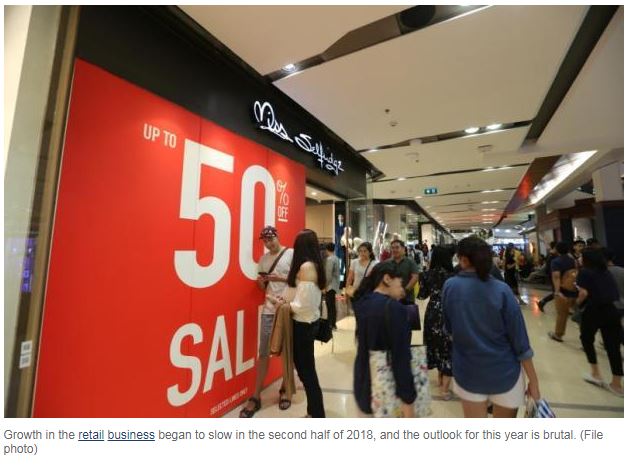Thailand: TRA predicts flat spending in first half
The Thai Retailers Association (TRA) predicts flat consumer spending in the first half, despite bullish consumer sentiment from the planned general election and the value-added tax refund for Chinese New Year shopping.
Worawoot Ounjai, TRA’s president, said the retail industry recorded slower growth during the first two months this year.
Mr Worawoot said retail recovered in 2018, but slowed in the third and fourth quarters.
In 2018 retail grew 3.1%, below GDP growth of 4-4.1%.
The retail and wholesale sector makes up 16.1% of manufacturing GDP, second behind industry. The sector employees 16% of the country’s labour force.
“Overall consumer spending in the first half is unlikely to recover as hoped,” he said, citing the government’s shopping tax incentives from Feb 1-15 as unlikely to entice many participants.
The latest data shows registration for the scheme at 10,000, with spending of about 10 billion baht, far lower than initial estimates of 6 million participants spending a total of 100 billion baht.
Recently, the University of the Thai Chamber of Commerce (UTCC) projected the general election and the shopping tax breaks are expected to greatly benefit not only large and medium-scale retail operators in Bangkok and the provinces, but also the overall economy in the first quarter.
The UTCC estimates 30-50 billion baht would be circulated during the campaign, boosting economic growth by 0.2-0.3%, while the government’s shopping tax incentives from Feb 1-15 are expected to increase consumer spending by around 10 billion baht, raising GDP growth by 0.05-0.1%.
Mr Worawoot said retailers are more upbeat about growth prospects of the retail industry in the second half.
If the government succeeds in accelerating completion of the bidding for the planned infrastructure projects within the first quarter, the investments are likely to drive growth of the retail sector at the end of the third quarter and the beginning of the fourth quarter, he said.
If not, the second half will be lethargic to failing for some business segments, said Mr Worawoot.
“The overall outlook for retail spending this year is not looking great. The middle to low-income consumer groups lack enthusiasm, while the middle to high groups are flat,” he said.
“This puts the retail sector at risk from uncertainty. The prospect of post-election instability also adds to retail uncertainty.”
The association recommends the government cut taxes on luxury goods while using promotions to attract more tourists.
An increase of wages for the elderly, introducing an hourly minimum wage and promoting border trade, would boost incomes and it is hoped consumer spending.
The group also suggests liberalising the duty-free shop sector by allowing other companies to operate duty-free stores at airports and retail spaces outside airports.
Facing a shortage of retail workers, the TRA wants the government to institute an hourly minimum wage to make it easier to hire part-time workers and the elderly.
Although the overall outlook for retail spending this year is not looking as good as expected, retailers still expect to aggressively expand their businesses this year, said Mr Worawoot.
Source: https://www.bangkokpost.com/business/news/1627638/tra-predicts-flat-spending-in-first-half


 Thailand
Thailand




